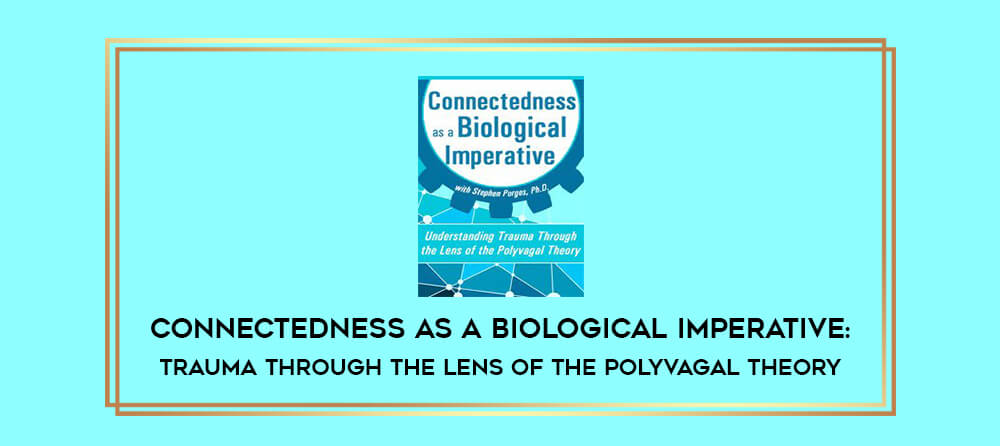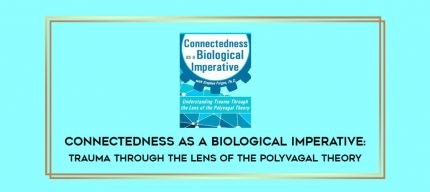Connectedness as a Biological Imperative: Trauma Through the Lens of the Polyvagal Theory
Course Description
Archive : Connectedness as a Biological Imperative: Trauma Through the Lens of the Polyvagal Theory Digital Download
Salepage : Connectedness as a Biological Imperative: Trauma Through the Lens of the Polyvagal Theory
Delivery : Online With Any Device
Bundles:
Conversations with Peter Levine, PhD
Faculty:
Stephen Porges, PhD | Peter Levine, Ph.D.
Duration:
1 Hour 01 Minutes
Format:
Audio and Video
Copyright:
Oct 19, 2021
Product Code:
POS058668
Media Type:
Digital Seminar
The Polyvagal Theory is a major scientific advancement in neuroscience with clinical applications to a new brain-body medicine providing insights into the treatment of trauma-related mental and physical health challenges. The theory describes how, via evolution, a connection emerged in the brain between the nerves that control the heart and the face. This face-heart connection provided the structures for the -social engagement system that link our bodily feelings with facial expression, vocal intonation, and gesture. The Polyvagal Theory provides a more informed understanding of the automatic reactions of our body to safety, danger, and life threat. The theory transforms the human narrative from a documentary (emphasizing events and objects) to a pragmatic quest for safety with an implicit bodily drive to survive (emphasizing feelings). This talk will explore the role of physiological state in facilitating either connectedness and intimacy or defense such as fight/flight, hypervigilance, dissociation, collapse, shutdown, and even syncope.
Stephen W. Porges, Ph.D., is a Distinguished University Scientist at Indiana University where he is founding director of the Traumatic Stress Research Consortium. He is Professor of Psychiatry at the University of North Carolina, and Professor Emeritus at both the University of Illinois at Chicago and the University of Maryland. He served as president of the Society for Psychophysiological Research and the Federation of Associations in Behavioral & Brain Sciences and is a former recipient of a National Institute of Mental Health Research Scientist Development Award. He has published more than 300 peer-reviewed papers across several disciplines including anesthesiology, biomedical engineering, critical care medicine, ergonomics, exercise physiology, gerontology, neurology, neuroscience, obstetrics, pediatrics, psychiatry, psychology, psychometrics, space medicine, and substance abuse. In 1994, he proposed the Polyvagal Theory, a theory that links the evolution of the mammalian autonomic nervous system to social behavior and emphasizes the importance of physiological state in the expression of behavioral problems and psychiatric disorders. The theory is leading to innovative treatments based on insights into the mechanisms mediating symptoms observed in several behavioral, psychiatric and physical disorders. He is the author of The Polyvagal Theory: Neurophysiological foundations of Emotions, Attachment, Communication, and Self-Regulation (Norton, 2011), The Pocket Guide to the Polyvagal Theory: The Transformative Power of Feeling Safe (Norton, 2017), and co-editor of Clinical Applications of the Polyvagal Theory: The Emergence of Polyvagal-Informed Therapies (Norton, 2018). He is the creator of a music-based intervention, the Safe and Sound Protocol ¢, which currently is used by more than 1400 therapists to improve spontaneous social engagement, to reduce hearing sensitivities, to improve language processing and state regulation.
Speaker Disclosure:
Financial: Dr. Stephen Porges has employment relationships with Indiana University Bloomington and the University of North Carolina. He is a published author and receives royalties. Dr. Porges receives a speaking honorarium, book royalties, and recording royalties from PESI, Inc. He is a scientific advisor to Integrated Learning Systems/Unyte and receives a royalty. All relevant financial relationships with ineligible organizations have been mitigated.
Non-financial: Dr. Stephen Porges is a member of the American Psychological Association, the Association for Psychological Science, and the Society for Psychophysiological Research.
Dr. Peter Levine holds doctorates in both medical biophysics and psychology. He is the developer of Somatic Experiencing ® (SE), a naturalistic body-awareness approach to healing trauma, which he teaches all over the globe. Dr. Levine is also the founder of the Foundation for Human Enrichment and was a stress consultant for NASA during the development of the space shuttle.
An accomplished author, Dr. Levine penned Healing Trauma, Sexual Healing and the bestselling book, Waking the Tiger. He also co-authored with Maggie Kline Trauma Through a Child’s Eyes and Trauma-Proofing Your Kids. His latest book, In an Unspoken Voice: How the Body Releases Trauma and Restores Goodness, is a testament to his lifelong investigation into the connection between evolutionary biology, neuroscience, animal behavior, and more than 40 years of clinical experience in the healing of trauma.
Dr. Levine was honored in 2010 with a Lifetime Achievement Award from the United States Association for Body Psychotherapy (USABP) and is a Senior Fellow at Meadows Behavioral Healthcare.
Speaker Disclosure:
Financial: Peter Levine is the Developer of Somatic Experiencing ®. He is the founder and Senior Advisor to the Foundation for Human Enrichment and Senior Advisor to The Meadows Addiction Treatment Center. Dr. Levine receives a speaking honorarium from PESI, Inc. He has no relevant financial relationships with ineligible organizations.
Non-financial: Peter Levine is a member of the American Psychological Association; Humanistic Psychological Association; and International Society for Traumatic Stress Studies.























Reviews
There are no reviews yet.